21ST IN A ROW AND STILL GOING STRONG!

Since the event is more of a fly-in meet rather than a contest, participants are pretty much free to fly as much as they’d like. There is no judging (except for special awards) or flight scoring— just pure jetting around a near-perfect Florida sky. Some of you with roots in jet activity may recall ducted fans being the primary propulsion system for “jet” models. Well, that entire mode of motion has grown, owing to a huge increase in the availability of electric ducted fan (EDF) power systems and airframes, mostly injection-molded foam, to the point that RC “jet” modeling now represents a significant segment of the hobby.
TECHNOLOGY MARCHES ON
More pure kerosene-fired turbines have arrived on the scene in a variety of sizes and thrust ratings, all the way from 6 pounds right on up to a whopping 50 pounds, making nearly any-size jet model a reality. Right along with this turbine progress, we find the ducted fan, this time taking advantage of the new generation and ever-improving “energy cells” of electric power, which have captured much of the RC world. Motors and battery-technology advances make this form of jet propulsion almost unbeatable and accessible now to a larger group of enthusiasts. Gone are the days of glow-powered ducted fan units with their erratic tuned pipes, critical needle-valve settings, blown glow plugs, and ear-piercing exhaust notes. In their place is the “plug in the battery, taxi out, and take off” simplicity and reliability of operation. So how did the mix of turbines and EDFs stack up at Florida Jets this time around?
This story is from the {{IssueName}} edition of {{MagazineName}}.
Start your 7-day Magzter GOLD free trial to access thousands of curated premium stories, and 9,000+ magazines and newspapers.
Already a subscriber ? Sign In
This story is from the {{IssueName}} edition of {{MagazineName}}.
Start your 7-day Magzter GOLD free trial to access thousands of curated premium stories, and 9,000+ magazines and newspapers.
Already a subscriber? Sign In
Legend Hobby / Seagull Models - Cessna Grand Caravan 208
The Cessna Grand Caravan 208 is a legend in aviation circles. A single engine utility aircraft that punches up with capabilities that rival many twin engine aircraft in its class. Its seemingly simple configuration belies its near extreme utility.
PROPER CG LOCATION FOR AEROBATICS
If you are getting into aerobatics and are starting to perform more advanced maneuvers, it is time to discuss ways you can not only become a better pilot, but how you can also improve the flight characteristics of your airplanes.
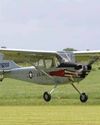
Legend Hobby 13-Foot L-19 Bird Dog/ Cessna O-1
This famous multi-mission single engine observation aircraft served from 1950-1974. From calling out target locations to providing intel/recon information, the Bird Dog was a valued asset in both the Korean War and Vietnam.
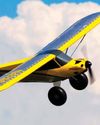
EARN YOUR WINGS
10 Tips for First-Flight Success
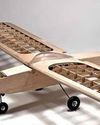
Old School Model Works Fifty Six
The Fifty Six takes its design cues from the original .09- to .15-size Carl Goldberg Falcon 56 of the 1960s. Reworked to incorporate modern, lasercut techniques to make kit building better than ever.
FLYING TWINS Multi-engine warbirds made easy
Let’s face it, there’s just something extra special about twin-engine RC aircraft. Most modelers stop what they’re doing when a twin fires up on the flightline.
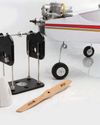
HOW TO BALANCE PROPELLERS
Four easy steps to increase performance and reduce vibration
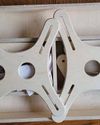
PRODUCT REVIEW: RC PLANE STANDS BENCHTOP MODEL
I’m a sucker for shop stuff. I buy tools I will probably never use just because they are cool, or I might need to use them someday. When Glen from RC Plane Stands reached out about a review, however, I knew as soon as I browsed their website that I would be receiving something I would use a lot, maybe even daily.
SPIRIT OF RHINEBECK AWARD WINNER
A close up of Norman Malinowski’s 1/3-scale Albatros
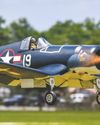
CENTER OF GRAVITY BASICS
The secret to a plane that flies well